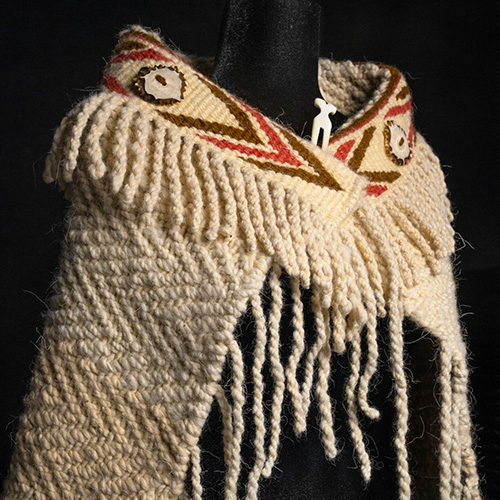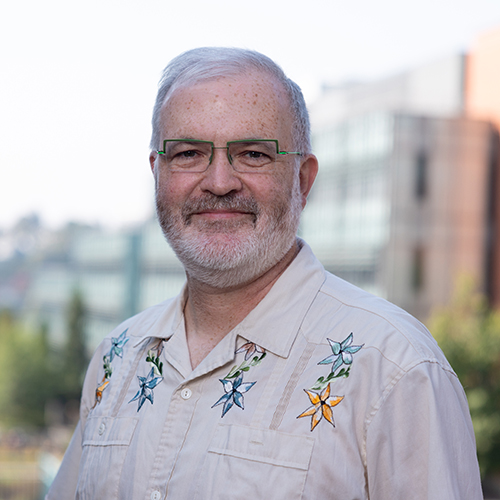
Cycling. Kayaking. Rock climbing. UW students enrolled in the course “Disability and Society: A Focus on Community and the Outdoors” participate in these and other outdoor sports with members of the disability community as part of their coursework. The experience is fun but also a powerful learning opportunity.
The course is offered by Disability Studies, an interdisciplinary program in the UW College of Arts and Sciences that focuses on representations and understandings of disability and society.

Jason Naranjo, core faculty in Disability Studies and associate teaching professor in UW Bothell’s School of Educational Studies, developed and teaches the course, which combines classroom time and outdoor experiences to help students explore what it means to provide access and disability justice for community members in recreation spaces. Naranjo also chairs UW Bothell's K-12 Behavioral Health Initiative, which seeks to understand and provide practical solutions for supporting children and youth behavioral health and wellness.
Here, Naranjo answers a few questions about the course.
What led you to create this course?
It came about because of students asking for it. I was teaching a course related to disability studies in education, and my students asked how they could take what they were learning in the classroom and begin to address issues of access and disability justice. I have deep experience partnering with K-12 public schools and training professional educators, but it was the first time I had general undergraduates asking for practical learning experiences in the community. That got me thinking about my own life and some of the work I do in the community, including volunteering with the Outdoors for All Foundation to teach downhill skiing. I was riding the chair lift at Stevens Pass with an Outdoors For All participant athlete when it hit me: This is the place. This is a place where people can come to understand what it means to make access real and support people with disabilities.
Why was the ski lift at Stevens Pass your ah-ha moment?
When we're outside in nature and playing with one another, we share common human experiences: joy, accomplishment, and sometimes fear. Often this means learning a new way of moving and being in the world. It also means developing relationships of trust with those we are with. There is such a rich context there to be able to teach, to learn, to recognize our commonalities, and to understand specific needs that a person with a disability might have in terms of support.
When we're outside in nature and playing with one another...there is such a rich context there to be able to teach, to learn, to recognize our commonalities, and to understand specific needs that a person with a disability might have in terms of support.
What is the structure of the course?
It’s roughly an 80-20 mix of community-engaged learning and classroom learning. For the community-engaged portion, we partner with the Outdoors for All Foundation. Outdoors For All is Washington’s largest provider of adaptive and inclusive recreation services for people with disabilities. They’ve been happy to work with the UW to co-construct these opportunities and experiences for our students and participants. Our first course offering was a winter course where UW students supported cross-country skiing, snowshoeing, downhill skiing, and snowboarding. Out of that success, we created the summer partnership, where our students are out in the field doing things like supporting access to rock climbing, paddle boarding, cycling, canoeing, kayaking, day camps, and adventure camps — all of the fun things that we love to do in the Pacific Northwest in the summer. This past summer, students spent up to eight full days working with the Outdoors for All Foundation, supporting inclusive and adaptive recreation.

What about the classroom portion of the course?
In the classroom, we focus on a core text that centers the voices and lived experiences of people with disabilities across the lifespan. Students also interact with a rich range of contemporary media and podcasts, that deal specifically with disability in the context of the outdoors. Students create projects — things like in-depth podcasts — that bring together their lived experience in the community with Outdoors For All with what they're learning through our course discussions, readings, and interactions with media. The course allows students to take what they are studying and see that made real in the community and vice versa — and also see where theory and practice don't always line up. If we expect our students to make a difference in our world, we must provide them with meaningful opportunities to apply what they are learning. My courses do just that.
What’s been the students’ response?
Students regularly tell me that the community-engaged learning experiences have been some of the deepest and enriching learning experiences they’ve had at the UW. These courses also make a significant impact in the community. Of the approximately 500 volunteers it takes to run Outdoor for All’s winter programs, our UW students make up nearly 10% of the volunteer population!
In this video, learn more about the winter quarter version of Jason Naranjo's course — and see the participants on the slopes.
When will you next teach the course?
In winter quarter 2025 I’ll be teaching the winter version of the course. I'll be on the snow with students at The Summit at Snoqualmie and at Stevens Pass. In partnership with The Outdoors for All Foundation, our students will be providing support and access to winter sports including snowshoeing, cross-country skiing, downhill skiing, and snowboarding. This community-engaged learning course is such a joy to create and teach!
Learn more about the University of Washington Disability Studies Program.
More Stories

A Healing Heart Returns
In February, the UW Symphony will perform a symphony that Coast Salish elder Vi Hilbert commissioned years ago to heal the world after the heartbreak of 9/11. The symphony was first performed by the Seattle Symphony in 2006.

Coast Salish Traditions are "Woven in Wool" at the Burke
A Burke Museum exhibit, co-curated by Coast Salish weavers and Burke curators, highlights the importance of weaving to Coast Salish communities.

Demystifying Quantum
In a physics course for non-STEM majors, Professor Miguel Morales teaches quantum mechanics without the advanced mathematics most quantum courses require.

